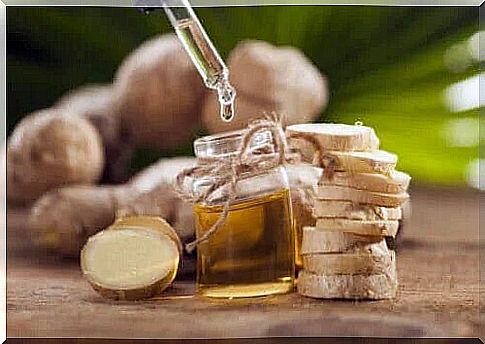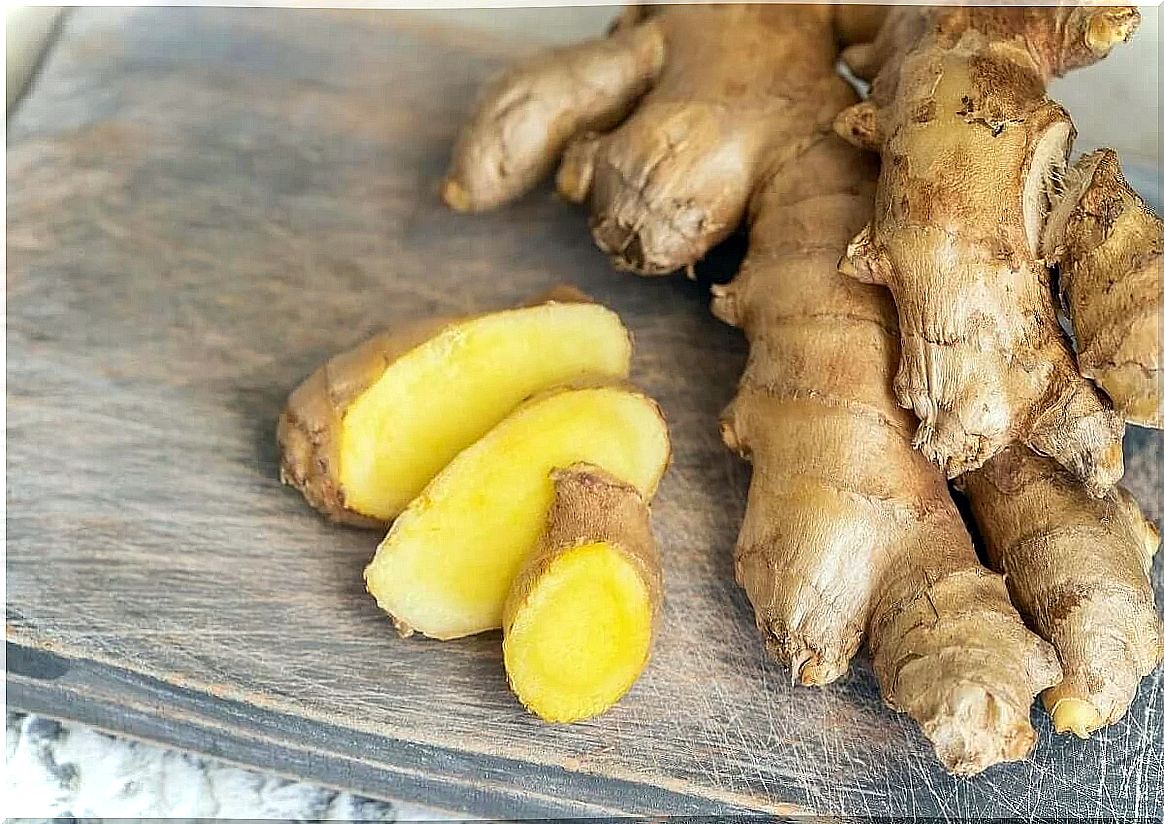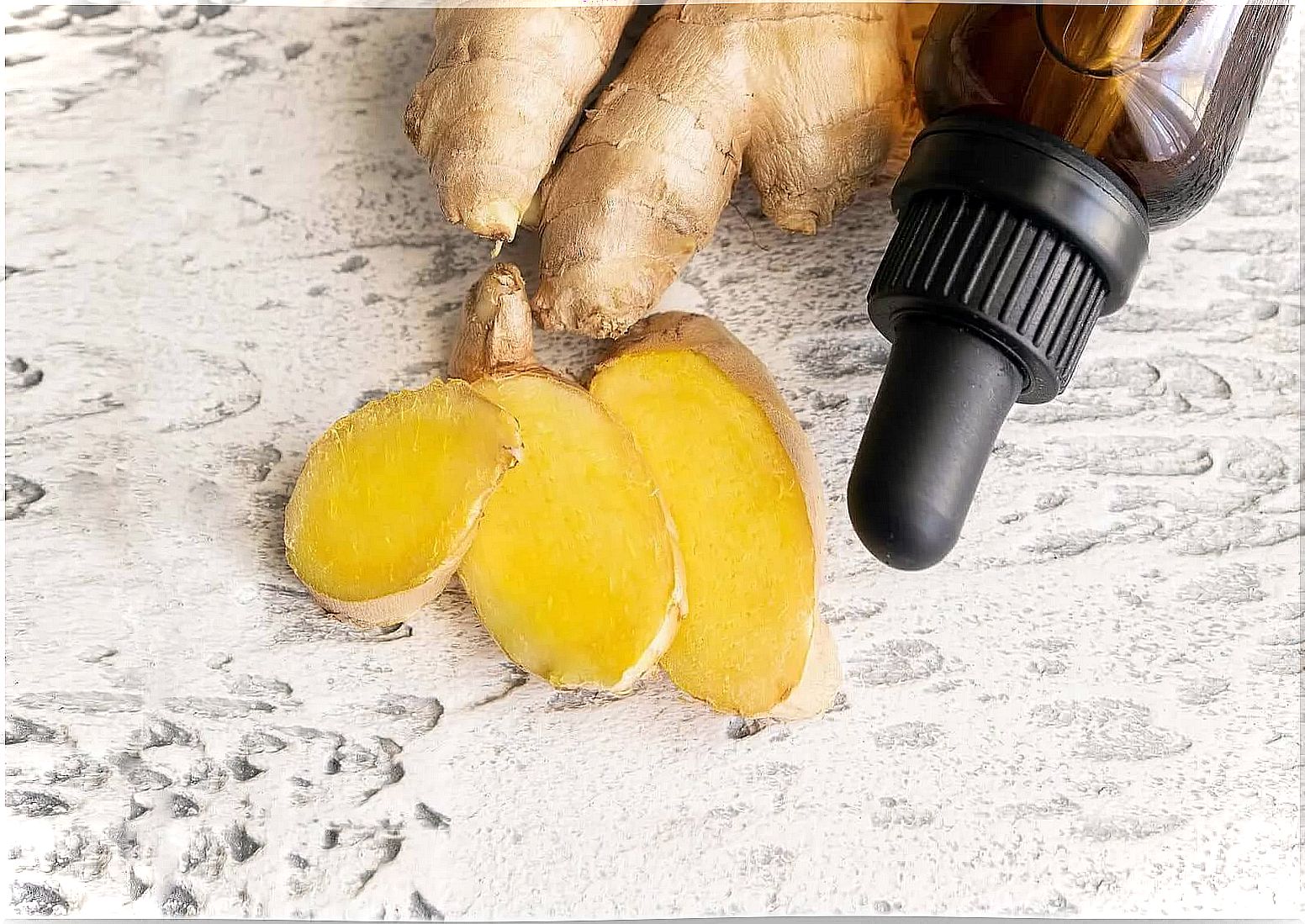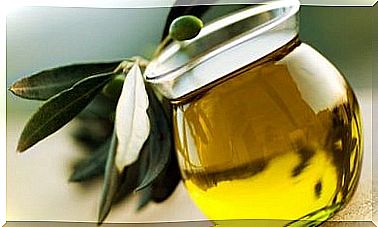Ginger Oil: Preparation And Benefits.

Have you ever used ginger oil ? Ginger, whose scientific name is Zingiber Officinale , is a plant prized for its medicinal and culinary uses. The most commonly used part of the plant is the rhizome, an underground stem that grows horizontally and is used to make tea and season meals.
You can buy it in the form of cubes, powder or grated form. However, today we want to talk specifically about the uses and benefits of ginger oil. We’ll even tell you how you can make it!
Here are some ways ginger and ginger oil can affect your health.
What is ginger oil?
Ginger oil is a greasy liquid obtained by subjecting the rhizome of the plant of the same name to a distillation process. Overall, it is a concentrated oil with a yellow color and a strong and pungent aroma. The uses and benefits of ginger oil are both medical and cosmetic.
Benefits of ginger oil
While many of the benefits attributed to ginger oil are anecdotal theories, there are also studies showing how it can improve a person’s health. Let’s take a look at some of them.
1. Natural anti-inflammatory agent
A study published in the Journal of Oleo Science has shown that ginger oil has anti-inflammatory properties, capable of preventing changes in renal function, which is associated with inflammation. It may also protect the kidneys of cadmium poisoned rodents.
At the same time, studies in rats with rheumatoid arthritis showed that although injection of ginger oil could not reduce acute arthritis, it was able to eliminate chronic inflammation.
Finally, other research that appeared in the Journal of Medicinal Food suggests that adding ginger oil extract to the diet of obese rodents may prevent weight gain and reduce markers of inflammation.
We must take into account that human studies still do not confirm the anti-inflammatory properties of ginger oil.

Ginger has various uses, ranging from being used as an anti-inflammatory to fighting nausea.
2. A measure to relieve nausea
According to traditional medicine, inhaling ginger oil vapor can eliminate nausea. We’ll see what science has to say about it.
A study published in the Journal of Alternative and Complementary Medicine was designed to evaluate the effectiveness of this oil in treating post-operative nausea. In the results, participants reported lower levels of vomiting than those who consumed the placebo.
However, a study published in BMC Complementary and Alternative Medicine produced conflicting results. This study compared the levels of postoperative nausea in children who inhaled a mixture of oils (including ginger oil) or a placebo. The results showed no difference.
3. Skin and joint care
According to a study published in the Journal of Cosmetic Science , ginger oil acts as a powerful antioxidant that, when combined with cream and other essential oils, can reduce skin roughness.
A rodent study in Phytotherapy Research found that daily topical application of ginger oil in combination with other essential oils can reduce the severity and inflammation of joints. However, more human research is still needed.
Other benefits of ginger oil
Other benefits of this oil include:
- Natural Aphrodisiac : According to a study published in the Jundishapur Journal of Natural Pharmaceutical Products , ginger oil acts as a natural aphrodisiac and cure for erectile dysfunction.
- Reduces anxiety : In Ayurvedic medicine, ginger oil is found to be effective in treating emotional problems such as fear, abandonment, and lack of self-confidence. At the same time, a study published in Bioorganic & Medicinal Chemistry showed that it can alleviate anxiety.
- Cures stomach upsets and other digestive problems : Folk medicine considers ginger essential oil one of the best natural remedies for indigestion, diarrhea and colic.
- Promotes Hair Growth : Traditionally, ginger oil has been used in shampoos and other products due to its supposed effect on hair growth. However, studies showed that one of its active ingredients, 6-gingerol, inhibited hair growth in animals.
How To Use Ginger Oil?
In cooking, ginger oil is used to flavor, enrich and flavor dishes. As it should be used in small amounts due to its invasiveness, it is recommended to combine it with other oils (e.g. extra virgin olive oil).
Aromatherapy
To get the benefits of this essential oil through aromatherapy, you can use a diffuser or an aerosol as well as steam inhalation. For the diffuser, you just need to follow the instructions of your model. Remember that there will be times when it will be necessary to dilute the oil in a little water.
To perform steam inhalation, we recommend the following steps:
- Heat the water until it starts to evaporate and pour it into a container.
- Add 1 or 2 drops of ginger oil.
- Cover your head with a towel.
- Close your eyes, lean over a container of water, and take a deep breath.
For topical use
If you intend to apply ginger oil to your skin, always dilute it with a carrier oil. Some oils that perform this function include almond oil, coconut oil, jojoba oil, and avocado oil.
Side Effects and Precautions
Ginger oil is considered safe but has few side effects. What’s more, keep in mind that many of them are ignorant, such as when you apply an oil to your skin without diluting it. It’s always a good idea to try a small amount first.
On the other hand, high doses of this essential oil can cause acidification, diarrhea, and mouth irritation. Pregnant and lactating women should not consume it without consulting a doctor. especially pregnant women must not take more than 1 gram per day.
Children over 2 years of age can use it to relieve nausea, cramps and headaches. However, consultation with a specialist is also required.
People taking anticoagulant medications should not take the essential oil without proper supervision as it increases the risk of bleeding. A similar situation occurs with patients with diabetes and high blood pressure, as the combination of drugs and oil can lower blood sugar and blood pressure too much.

Consumption of this oil should be limited in diabetics and people with hypertension, as well as taking anticoagulant medications.
How to prepare ginger oil at home?
You can prepare it in the comfort of your own kitchen using the ingredients and instructions below.
Ingredients
- Fresh ginger.
- Olive oil.
Instructions
- Peel the ginger, cut into small pieces and grate it.
- Add the grated ginger to the bowl of olive oil.
- Stir, put in the oven and set aside for 2 hours.
- When the ginger is in the oven, prepare a container, which will later be covered with a white sterilized cloth.
- After 2 hours, pour the mixture onto a cloth and squeeze the oil into a container.
- Then pour the oil into a glass container with a tight-fitting lid and store in a cool, dry place.
What to remember when using ginger oil
Obtained from the rhizome of the plant of the same name, ginger oil is easy to recognize by its strong and spicy smell. Often used in conjunction with other oils for seasoning salads.
Likewise, benefits such as reducing anxiety, improving skin health, and relieving anxiety can be obtained through topical application and techniques such as aromatherapy.
When it comes to side effects, while it is a safe measure, you shouldn’t overdo the quantity. Children, pregnant and lactating women should consult their doctor before using it.









